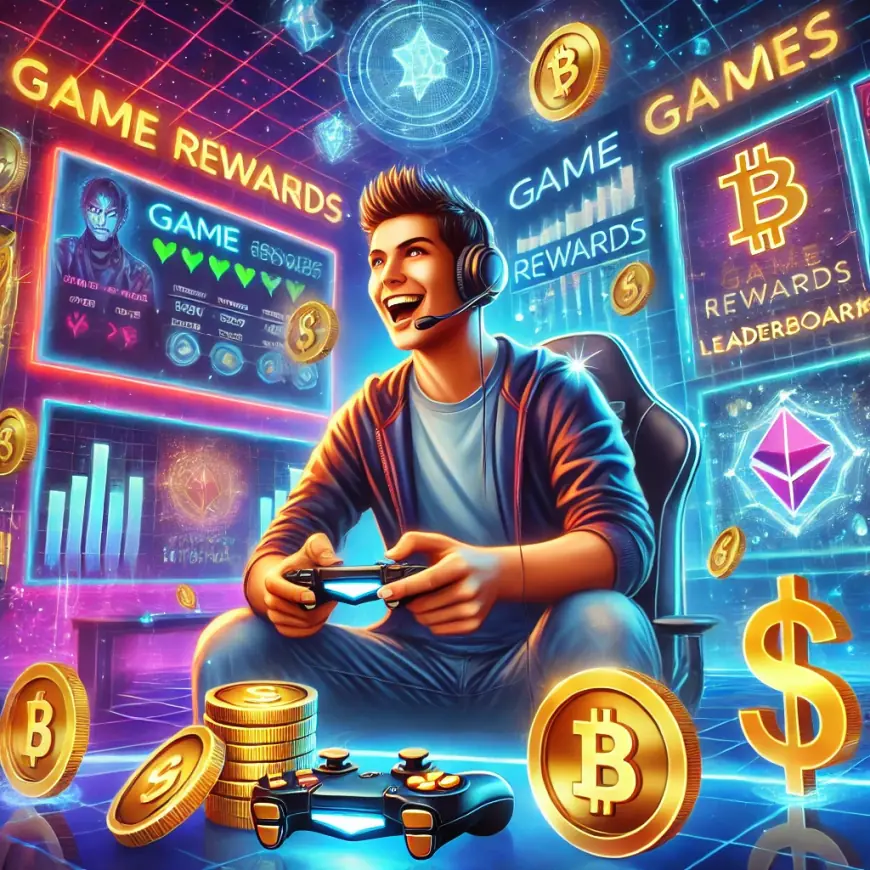The Rise of Play-to-Earn Games: How Blockchain is Shaping the Future of Gaming
Play-to-earn games are games where players can earn real-world value, such as cryptocurrency or NFTs (non-fungible tokens), as rewards for their in-game actions.

The gaming industry has evolved dramatically over the years, and one of the most exciting innovations today is the rise of play-to-earn (P2E) games. As blockchain technology continues to shape various industries, it has made a profound impact on the gaming world. In this post, I will discuss how blockchain is not only transforming how players interact with games but also how it is shaping the future of gaming itself. Specifically, I will examine how these advancements are contributing to the growth of P2E games and the opportunities they present for both developers and players.
What Are Play-to-Earn Games?
Play-to-earn games are games where players can earn real-world value, such as cryptocurrency or NFTs (non-fungible tokens), as rewards for their in-game actions. Unlike traditional games, where players simply purchase virtual goods or progress through levels to enhance their gaming experience, P2E games offer players an opportunity to profit from their skills and time spent playing. These games operate on blockchain technology, providing a transparent, secure, and decentralized ecosystem where the ownership of digital assets is validated and maintained.
Players can earn digital assets by completing tasks, winning battles, or simply participating in a game's economy. These assets can be sold or traded on various marketplaces, offering players a new avenue to monetize their gaming experience. As a result, many players are now looking at gaming not only as a form of entertainment but also as a potential source of income.
Blockchain Technology: The Backbone of P2E Games
Blockchain technology plays a central role in the development of P2E games. Essentially, blockchain is a decentralized digital ledger that records transactions across many computers, ensuring transparency and security. In the context of P2E games, blockchain allows players to truly own their in-game assets, which are represented as NFTs or cryptocurrencies.
In comparison to traditional games, where virtual items and currencies are controlled by the game developers, blockchain-based games give players real ownership of their assets. This means that, once an item is created in the game, it can be traded, sold, or even transferred to other games. For example, a player might earn a unique weapon in a blockchain-based RPG game, and they can sell that weapon to another player for cryptocurrency or use it in a different game.
The integration of blockchain into games has opened up entirely new economies, where players can trade assets across multiple games and platforms. As a result, developers and players alike are benefiting from this new structure, which promotes fairness, transparency, and decentralized control.
The Growth of Play-to-Earn Games
The popularity of play-to-earn games has surged in recent years. Initially, the concept was met with skepticism, but as blockchain technology became more mainstream, so did the acceptance and growth of P2E games. Today, many popular games, such as Axie Infinity and Decentraland, allow players to earn cryptocurrency by engaging in the game’s activities.
One of the driving factors behind the rise of P2E games is the potential for financial gain. In many countries, especially those with developing economies, P2E games have become a way for individuals to earn a living. Players in regions such as Southeast Asia have been able to earn significant amounts of money by participating in these games. In some cases, players can even make more money playing games than they would working a traditional job.
Additionally, the accessibility of blockchain technology has played a significant role in the growth of P2E games. Many blockchain platforms, such as Ethereum, have made it easier for developers to build decentralized applications (dApps), including games. These platforms allow for the creation of smart contracts that automate transactions, ensuring that players are rewarded fairly for their contributions to the game.
The Role of NFTs in Play-to-Earn Games
NFTs have become an essential element of play-to-earn games. These digital assets are unique, meaning they cannot be replaced or exchanged on a one-to-one basis, making them ideal for representing in-game items such as characters, weapons, or land plots. In some games, players can buy, sell, or trade NFTs on dedicated marketplaces, creating a thriving secondary market for digital assets.
NFTs allow players to have true ownership of in-game items, which can increase the value of these items. For example, a rare sword in a fantasy P2E game might sell for a significant amount of cryptocurrency, depending on its rarity and demand. Similarly, players can buy land in virtual worlds like Decentraland and rent it out to others, earning passive income from their investment.
The ability to buy and sell these assets also means that players can choose how to participate in the game’s economy. Some may prefer to focus on acquiring rare items to sell, while others may focus on crafting or farming in-game resources to earn rewards. This flexibility is one of the reasons why P2E games are so appealing to a broad audience.
Opportunities for Game Developers and Investors
For game developers, P2E games offer a new way to generate revenue. Rather than relying solely on upfront purchases or in-app purchases, developers can create games with integrated economies that allow players to spend and earn cryptocurrency. This not only attracts players who are looking for ways to earn money but also provides a long-term revenue stream for developers.
Moreover, the rise of P2E games has attracted the attention of investors who see potential in blockchain-based gaming. Investors can support P2E games through funding, and in return, they may receive a share of the profits or early access to new game assets. As a result, many investors are now looking at P2E games as a promising investment opportunity.
However, the success of these games depends on the strength of their in-game economies and the community of players that sustain them. A well-designed P2E game with a balanced economy can thrive, but if the in-game economy becomes unstable, the game may fail to retain its player base. Therefore, developers must carefully consider factors such as tokenomics, player incentives, and game mechanics to ensure the long-term viability of their projects.
The Future of Play-to-Earn Games
The future of play-to-earn games looks bright, with more players and developers getting involved in the space. As blockchain technology continues to improve, we can expect to see even more sophisticated games and economies. Moreover, as mainstream gaming platforms begin to explore blockchain, the integration of P2E elements into traditional games could become more common.
For example, some major gaming companies are already experimenting with blockchain and NFTs, and it’s possible that in the future, games like eternal slots casino games may integrate P2E elements, allowing players to earn rewards while enjoying classic casino-style gameplay. This could open up new opportunities for players who enjoy gaming but also want to monetize their time.
Despite the exciting potential of P2E games, there are still challenges that need to be addressed. Issues such as high transaction fees, environmental concerns about blockchain networks, and the volatility of cryptocurrencies must be considered. Nevertheless, these challenges are being actively worked on, and with continued innovation, it is likely that P2E games will become a major force in the gaming industry in the coming years.
Conclusion
In conclusion, the rise of play-to-earn games powered by blockchain technology is reshaping the future of gaming. With the ability to earn real-world value through gaming, players are now able to monetize their time and effort in ways that were previously impossible. Blockchain provides a secure and transparent framework for digital ownership, while NFTs and cryptocurrency offer new forms of in-game rewards. For developers, this opens up new revenue streams and investment opportunities, while players can enjoy a new kind of gaming experience that offers financial rewards in addition to entertainment.
As the gaming industry continues to evolve, I believe that P2E games will become an increasingly important part of the landscape. With the ongoing advancements in blockchain and the growing interest in digital assets, the future of gaming is bright, and the possibilities are limitless.
What's Your Reaction?
 Like
0
Like
0
 Dislike
0
Dislike
0
 Love
0
Love
0
 Funny
0
Funny
0
 Angry
0
Angry
0
 Sad
0
Sad
0
 Wow
0
Wow
0















































